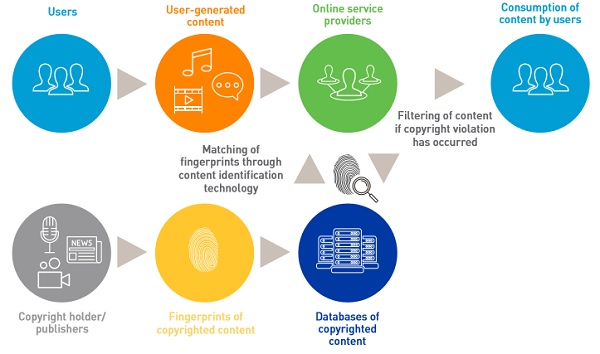The impact of a content-filtering mandate on online service providers
 Introduction
Introduction
Legislators in the EU have proposed the introduction of mandatory content filters for providers of online services, intended to better protect the rights of copyrights holders. While work has been done on the technical feasibility of such filters, little time has been spent on considering the practicalities of implementing such a mandate and the costs this would impose on the affected parties. The purpose of this study is to explore the likely impact of such an obligation on the providers of online audiovisual services and to quantify the associated direct and indirect costs and benefits. For this purpose, Analysys Mason has drawn on its own research as well as interviews with online service providers, start-ups, producers of content-recognition technologies and legal experts to examine the potential impact of the legislative proposal.
The language of the proposed directive suggests that all types of online service providers will have to proactively filter content, regardless of its nature. The proposed text of the directive mandates platforms to comply using technical measures, although these are not specified. Whilst certain relevant technical components exist for limited types of content, no such solutions exist for the vast amount of content and platforms that appear to fall within the scope of the proposed directive. A content-filtering mandate would impose high costs on those platforms for which limited solutions already exist, while the possibilities of developing additional technologies to comply with the proposed legislation are fraught with difficulty and potentially extremely costly.

Conclusion
The content-filtering mandate as proposed by the European Commission and taken up by the European Council requires technological and commercial solutions that are currently not available for many types of content, and not available to many companies, including in particular the start-ups and scale-ups that are essential to the growth of the technology sector in the EU. The automated recognition of content is not possible for all forms of content that are used by online service platforms, such as 3D printing or software code, and is not likely to be developed in the immediate future. OSPs that use such content would find it impossible to comply with such a burdensome mandate and would be subject to large legal uncertainties related to their compliance with copyright law. In the case where content-filtering technologies exist, such as for audio or video content, they are not accurate enough to correctly detect all types of content and can be circumvented by distorting or manipulating files.
In addition to content-recognition technology, the successful identification of copyright violations requires the existence of content databases against which UGC can be compared. In the case where filtering technologies exist, these databases are at present either fragmented or non-existent. Currently, certain rights holders maintain their own databases, for instance for video content, and harmonisation of such structures across different countries is likely to be beset by difficulties relating to differences in national copyright law as well as co-ordination problems.
As shown above, while certain companies at present deploy limited content-identification technologies, the cost of these for smaller platforms quickly reaches significant levels as a result of universal application and the need for cross-referencing of content against multiple databases for either multiple rights holders or multiple types of content. It is therefore likely that such a mandate would have a negative effect on the provision of digital services in Europe and would significantly hamper the development and growth of existing digital business models. Given the current technological, legal and commercial environment, a content-filtering mandate would appear to be impossible for a vast number of online service platforms to implement, inefficient at dealing with copyright infringements, as well as imposing significant costs on start-ups and medium-sized companies.
The full report is available to download here.
Download infographic of key issues.
Acknowledgments
The authors wish to thank Allied 4 Startups and Google for their sponsorship and representatives for the following companies for talking to us as part of this research: Dubset Media, EyeEm, LTU Tech, PaperHive, Sentione, Shapeways.
This research was conducted independently by Analysys Mason in May 2018.
The impact of a content-filtering mandate on online service providers
This study examines the potential impact of the legislative proposal and the associated costs and benefits.
Download your free copyAuthor

David Abecassis
Managing Partner, expert in strategy, regulation and policyLatest Publications
Article
Digital twins will transform the sustainability of digital infrastructure
Report
The European telecoms regulatory framework: not a good fit for the public cloud
Report
The impact of network usage fees on the Brazil cloud market
